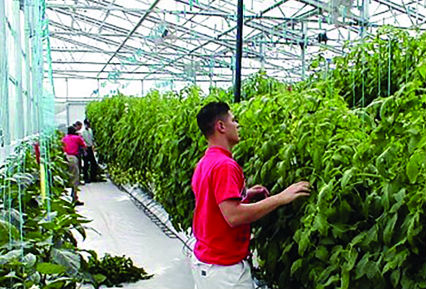Jun 9, 2020Participants sought for Cornell indoor farm survey
A Cornell University team is leading a new project to investigate how controlled environment agriculture compares to conventional field agriculture in terms of energy, carbon and water footprints, profitability, workforce development and scalability.
Strategic FEW (food, energy, water) and Workforce Investments to Enhance Viability of Controlled Environment Agriculture in Metropolitan Areas is funded by a three-year, $2.4 million grant from the National Science Foundation, through its new funding initiative called Innovations at the Nexus of Food, Energy and Water Systems.
Controlled environment agriculture (CEA), such as greenhouses or plant factories, may provide an alternative to conventional systems of field-based production and long-distance transportation to supply metropolitan areas with locally-grown vegetables. However, comprehensive information is lacking on the environmental (energy, carbon and water footprint) and economic sustainability (profitability, work force development) as well as the scalability of CEA compared to conventional field production.
A systems modeling approach will be used to compare the economic and environmental footprint of CEA vs. field vegetable supply chains, test novel systems to optimize resource use efficiency in CEA vegetable production, foster industry-research networks and structured workforce development programs to facilitate the acceptance, adoption and continued improvement of viable CEA systems in metropolitan areas. Collectively, the project will:
- Lay the groundwork for more sustainable FEW (food, energy, water) systems exemplified by CEA and vegetable production.
- Provide knowledge and insights to enable informed decision making by policy makers, city planners, entrepreneurs and current CEA operators.
- Develop educational resources to train an appropriate workforce for a growing CEA industry.
Visit here to take the survey.
More information:
- Viability of indoor urban agriculture is focus of research grant – Cornell Chronicle, October 12, 2017.
- Award Abstract – NSF website
- Project team















